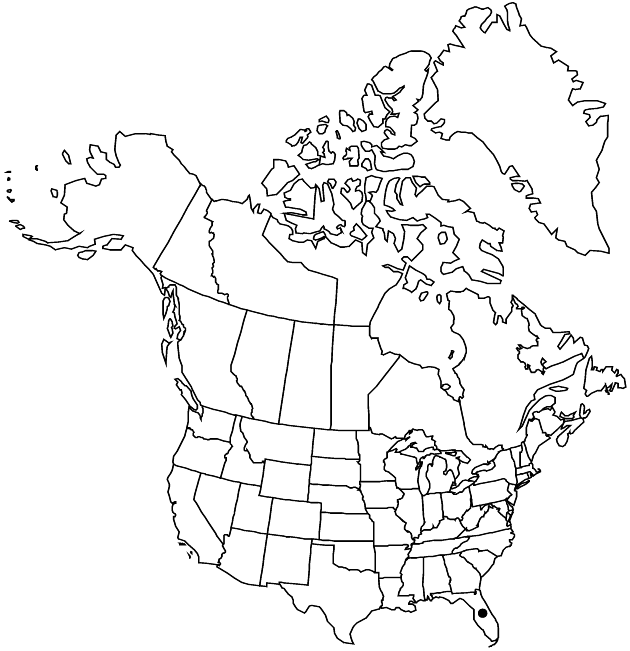Difference between revisions of "Ageratum maritimum"
in A. von Humboldt et al., Nov. Gen. Sp. 4(fol.): 117. 1818.
4(qto.) 150. 1820.
FNA>Volume Importer |
imported>Volume Importer |
||
| (6 intermediate revisions by 2 users not shown) | |||
| Line 1: | Line 1: | ||
{{Treatment/ID | {{Treatment/ID | ||
|accepted_name=Ageratum maritimum | |accepted_name=Ageratum maritimum | ||
| − | |accepted_authority=Kunth | + | |accepted_authority=Kunth |
|publications={{Treatment/Publication | |publications={{Treatment/Publication | ||
|title=in A. von Humboldt et al., Nov. Gen. Sp. | |title=in A. von Humboldt et al., Nov. Gen. Sp. | ||
|place=4(fol.): 117. 1818 | |place=4(fol.): 117. 1818 | ||
|year=1818 | |year=1818 | ||
| − | }}{{Treatment/Publication | + | }}, {{Treatment/Publication |
|place=4(qto.) 150. 1820 | |place=4(qto.) 150. 1820 | ||
|year=1820 | |year=1820 | ||
| Line 15: | Line 15: | ||
|name=Ageratum littorale | |name=Ageratum littorale | ||
|authority=A. Gray | |authority=A. Gray | ||
| − | }}{{Treatment/ID/Synonym | + | |rank=species |
| + | }} {{Treatment/ID/Synonym | ||
|name=Ageratum littorale var. hondurense | |name=Ageratum littorale var. hondurense | ||
|authority=B. L. Robinson | |authority=B. L. Robinson | ||
| + | |rank=variety | ||
}} | }} | ||
|hierarchy=Asteraceae;Asteraceae tribe Eupatorieae;Ageratum;Ageratum maritimum | |hierarchy=Asteraceae;Asteraceae tribe Eupatorieae;Ageratum;Ageratum maritimum | ||
| Line 33: | Line 35: | ||
|elevation=0–10 m | |elevation=0–10 m | ||
|distribution=Fla.;Mexico (Quintana Roo);West Indies (Cuba;Hispaniola);Central America (Belize). | |distribution=Fla.;Mexico (Quintana Roo);West Indies (Cuba;Hispaniola);Central America (Belize). | ||
| − | |discussion=<p>Plants from Florida (Ageratum littorale, the type from Florida) are described here. Plants of the West Indies and Mexico (broadening the species concept to A. maritimum, the type from Cuba) have various elaborations of vestiture and a more conspicuous pappus–coronas with even to laciniate margins or rings of nearly separate scales mostly 0.2–1.5 mm. In addition to the distinctive relatively small, glabrous or glabrate leaves, plants of A. maritimum are characterized by heads in clusters, usually held well beyond the leaves.</p> | + | |discussion=<p>Plants from Florida (<i>Ageratum</i> littorale, the type from Florida) are described here. Plants of the West Indies and Mexico (broadening the species concept to <i>A. maritimum</i>, the type from Cuba) have various elaborations of vestiture and a more conspicuous pappus–coronas with even to laciniate margins or rings of nearly separate scales mostly 0.2–1.5 mm. In addition to the distinctive relatively small, glabrous or glabrate leaves, plants of <i>A. maritimum</i> are characterized by heads in clusters, usually held well beyond the leaves.</p> |
|tables= | |tables= | ||
|references= | |references= | ||
| Line 42: | Line 44: | ||
-->{{#Taxon: | -->{{#Taxon: | ||
name=Ageratum maritimum | name=Ageratum maritimum | ||
| − | + | |authority=Kunth | |
| − | |authority=Kunth | ||
|rank=species | |rank=species | ||
|parent rank=genus | |parent rank=genus | ||
| Line 57: | Line 58: | ||
|publication year=1818;1820 | |publication year=1818;1820 | ||
|special status= | |special status= | ||
| − | |source xml=https:// | + | |source xml=https://bitbucket.org/aafc-mbb/fna-data-curation/src/2e0870ddd59836b60bcf96646a41e87ea5a5943a/coarse_grained_fna_xml/V19-20-21/V21_1210.xml |
|tribe=Asteraceae tribe Eupatorieae | |tribe=Asteraceae tribe Eupatorieae | ||
|genus=Ageratum | |genus=Ageratum | ||
Latest revision as of 20:08, 5 November 2020
Annuals or perennials, 10–50 cm (semisucculent, rhizomatous, forming colonies). Stems decumbent to straggling or creeping (rooting at nodes), glabrous but for puberulous-pilose nodes. Leaf blades deltate-ovate to oblong, mostly 0.8–4 × 0.5–3 cm, (fleshy) margins toothed, faces glabrous or glabrate. Peduncles glabrous or glabrate. Involucres ca. 3 × 3–4 mm. Phyllaries elliptic-lanceolate, glabrous or glabrate, tips abruptly tapered to nearly obtuse. Corollas lavender or blue to white. Cypselae glabrous; pappi usually blunt coronas ca. 0.1 mm, rarely of separate scales.
Phenology: Flowering year round.
Habitat: Beach sand and nearby thickets, coral soils, salt marshes, hammocks, roadsides
Elevation: 0–10 m
Distribution

Fla., Mexico (Quintana Roo), West Indies (Cuba, Hispaniola), Central America (Belize).
Discussion
Plants from Florida (Ageratum littorale, the type from Florida) are described here. Plants of the West Indies and Mexico (broadening the species concept to A. maritimum, the type from Cuba) have various elaborations of vestiture and a more conspicuous pappus–coronas with even to laciniate margins or rings of nearly separate scales mostly 0.2–1.5 mm. In addition to the distinctive relatively small, glabrous or glabrate leaves, plants of A. maritimum are characterized by heads in clusters, usually held well beyond the leaves.
Selected References
None.